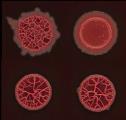Sociomicrobiology

Bacterial cells have evolved over billions of years to engage in complex multicellular networks dominated by mutual interactions. The "Social Evolution" research programme aims to provide fundamental insight into the general background and principles of microbial evolution and ecology via detailed studies of interactions in complex microbial populations.
The research focus on two primary bacterial activities leading to social interaction: Horizontal gene transfer (HGT), and the production of chemicals that are essential for the establishment and maintenance of social interactions (common goods) such as extracellular catabolic enzymes, signalling compounds, antibiotics etc. These two activities account for a very large part of all social interactions, and are the basis of many useful applications in biotechnology, medicine and agricultural production.
Genomics
The spread of plasmids carrying antimicrobial resistance or other undesirable functions has come under increased scrutiny in recent years.
Read more Click here
Studies performed by our group have had a substantial contribution to our current knowledge on horizontal gene transfer in aquatic and terrestrial environments.
Write a project on Sociomicrobiology
|
Exploiting evolution: Designing microbial interactions for industrial scenarios. This project will address the use of microbial communities to maintain increased food and energy production in an environmentally friendly and sustainable way. We are planning to isolate and identify microbial communities (bacteria or fungi) to construct synthetic microbial consortia to help in bio-industrial processes and support Europe’s developing bio-economy. |
Horizontal gene transfer Increased antibiotic resistance in a wide range of human pathogens is a growing public health threat. This rapid spread of antibiotic resistance genes is mediated by mobile genetic elements like plasmids, which can be rapidly transferred between microorganisms. We study plasmid transfer in various natural environments such as wastewater, soil and |
Section of Microbiology
 Where No Idea Is TOO small
Where No Idea Is TOO small
Contact
 TT Assistant professor
TT Assistant professor
Jonas S. Madsen
Universitetmarken 15
Building 1, 1st floor
DK-2100 Copenhagen
Email: JSMadsen@bio.ku.dk
 Professor
Professor
Søren J. Sørensen
Universitetsparken 15
Building 1, 1st floor
DK-2100 Copenhagen
Email: sjs@bio.ku.dk
